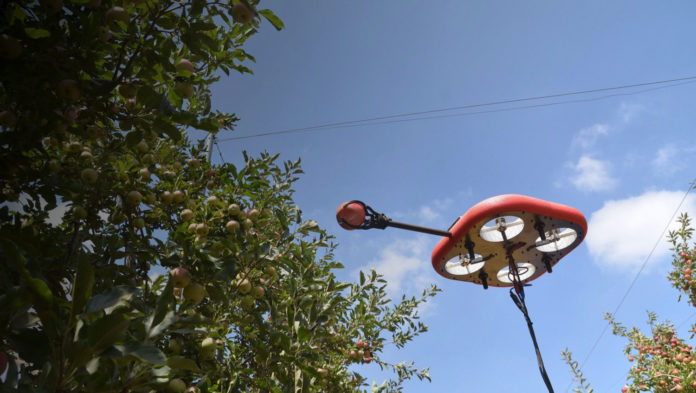There is a global shortage of seasonal fruit pickers as a result of the enforced COVID-19 travel restrictions. As it is getting harder to find fruit pickers to harvest the world’s orchards, some farmers are turning to AI drones to pick their crops.
Now an Israeli company, Tevel Aerobotics Technologies, has developed a flying autonomous robot (FAR) that utilizes artificial intelligence (AI) to identify and pick the ripest fruit. It combines artificial intelligence with computer vision, advanced robotics, aeronautical engineering, state-of-the-art flight control, and data fusion and perception.
The FAR robot can work 24 hours a day and pick only ripe fruit. It uses AI perception algorithms to locate the trees and vision algorithms to detect the fruit among the foliage and classify its size and ripeness. After choosing the right fruit, the robot works out the best way to approach the fruit and remain stable as its picking arm grasps it.
Several FAR robots can harvest the orchards without getting in each other’s way thanks to a single autonomous digital brain in a ground-based unit. Tevel’s fruit picking robot delivers the highest performance at the lowest cost, along with high levels of flexibility that enable the harvest of multiple fruit types, including apples, pears and avocado. They also work on thinning and pruning functions.
“There are never enough hands available to pick fruit at the right time and the right cost. Fruit is left to rot in the orchard or sold at a fraction of its peak value, while farmers lose billions of dollars each year,” the company says.
Such robots and artificial intelligence always bring up the topic of human unemployment. However, the company states that its robots are designed to complement human fruit pickers rather than replace them.
The Israeli start-up Tevel wants to market its first autonomous fruit-picking robot drone by 2021. To help it, the Japanese agricultural machinery manufacturer Kubota has recently invested $20 million in its project.
